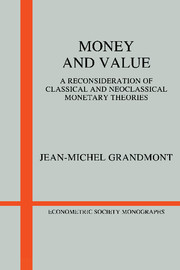Introduction
Published online by Cambridge University Press: 05 January 2013
Summary
One of the major theoretical issues that underlies, implicitly or explicitly, quite a few recurrent controversies in macroeconomics is whether a competitive monetary economy has built-in mechanisms that are strong enough to remove excess demands and supplies on all markets, through an automatic adjustment of the price system.
Debate on this issue was most intense after the publication of Keynes's General Theory in 1936. Keynes denied, in complete contradiction to the then-prevailing doctrine, that price and wage flexibility would guarantee market clearing. On the contrary, he claimed that a fully competitive economy could well get "trapped" into a severe disequilibrium (unemployment) situation.
Pigou (1943) began the counterattack, which was subsequently developed over the years by Patinkin (1965), Friedman (1956, 1969), and Johnson (1967), among a host of others. The essential argument was that Keynes overlooked an important class of regulating mechanisms, namely, the real balance, or wealth effects, which are associated with a general movement of nominal prices and wages and/or with a variation of nominal interest rates. A broad agreement was reached in the 1950s, known as the "neoclassical synthesis": If such wealth effects were properly integrated in the analysis, full price flexibility - by which is meant that the price system reacts infinitely fast to a market imbalance at every moment, e.g., through a Walrasian tȃtonnement process - was bound to remove all excess demands and supplies, both in the short run and in the long run. Keynes was theoretically mistaken, and the unemployment he talked about was entirely due to his assumption that nominal wages were rigid downward.
- Type
- Chapter
- Information
- Money and ValueA Reconsideration of Classical and Neoclassical Monetary Economics, pp. 1 - 7Publisher: Cambridge University PressPrint publication year: 1983



